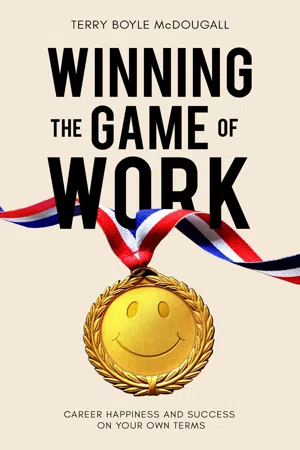![]()
PART 1
![]()
CHAPTER 1
Nothing is like it seems, but everything is exactly like it is.
—Yogi Berra
How Can Work Be a Game?
After more than thirty years working and coaching hundreds of professionals on success, I know work is essentially a game.
Work encompasses the activities you do to earn money to buy the stuff you and your loved ones need for survival—as well as enjoyment. You may have worked hard to gain the education and experience required to do your job. In addition, part of your identity may be tied to what you do for a living.
Think about how often “What do you do?” and “Who do you work for?” come up in casual conversations with acquaintances. For better or worse, people rank and categorize our place in society based on our work.
In contrast, games are activities we usually take part in for fun. If you lose a game, you might say, “No big deal. I’ll get ’em next time.” However, if you lose your job, that probably won’t be your reaction. So, I get it. It feels weird to frame work as a game, because work is such an important organizing force in your life. But that’s precisely why I propose that you look at it this way. It provides much-needed perspective.
Gaining Objectivity to be Strategic
We can get so attached to our work that we have a hard time being objective about it. It’s so personal. I see it all the time in my coaching practice when clients experience difficulty at work. It’s natural to get emotionally involved in what’s going on and feel helpless, hopeless, or angry and at a loss about how to make the situation better. This causes stress, which spills over and affects personal relationships and health—physically and mentally.
If you think about it, work and games have many things in common. Much like a game, work has an objective, which in for-profit businesses, is making money, and it has rules about how you play, as well as strategies that employees use to get ahead. The advantage of viewing work as a game is that it creates some distance between you as the “player” and the dynamics of the business.
It enables you to see the larger game board and opportunities that would be impossible to see when you’re in the middle of the activity. When you understand this, you can be more strategic and focus on achieving longer-term goals.
When you fail to create this type of distance, you can’t see the whole board, and this can leave you feeling like a pawn. If you can’t see what’s going on around you, you can’t be strategic. When you leave yourself no moves, you are at the mercy of savvy players. That can leave you feeling helpless, and no one wants to feel that way.
There’s More to Work Than It Seems
I used to look at the workplace dynamic as a simplistic relationship between employer and employee. The business had an objective—to make money. The employer made up the rules of how that would happen, decided what the employees would do—or not do—to deliver the value that customers paid for.
The employees showed up, performed the activities associated with their roles, picked up a paycheck, and went home. Wash, rinse, repeat. The employees who did their jobs in a superlative way would naturally be recognized and promoted. It seemed simple.
Maybe you picked up this book because, in your career, it’s become apparent that it’s not that simple after all. You might feel a little lost, even cheated, if you’re not getting the results you expect from your efforts at work.
Your frustration is understandable. If you’re confused about where you are and about the rules of unsuccess that you have to unlearn, your feelings are justified. Let’s work through it. The best revenge is success, right? So let the lessons begin.
Playing by the Wrong Rules
If you’re not getting success and satisfaction from your job, it may be because work really is a game, and you don’t know the rules. After all, if you’re not achieving the objectives you desire, then something is not working.
Many factors can contribute to unattained goals. However, if you’re experienced, working hard on the right things, and still not getting the results you desire, you could be metaphorically playing Monopoly by Twister’s rules.
It’s Déjà Vu All Over Again
I started this chapter with a quote widely attributed to Yogi Berra. He was a catcher with the New York Yankees for eighteen seasons from the 1940s to the 1960s, and though he holds the record for the most World Series Championships as a player—ten —he is arguably best known nowadays for his quirky quotes. Even if you’re not familiar with Berra, you’ve probably heard, or even repeated, some of his sayings, such as, “It ain’t over till it’s over,” “It’s déjà vu all over again,” and “When you come to a fork in the road, take it.”
The fascinating thing about these “Yogisms,” and a large part of why his name is still brought up today, is the ironic wisdom they contain. At face value, the sayings contradict themselves and make no sense, yet a deeper truth comes from them that isn’t perceived initially. Like the quote at the beginning of this chapter, there can be a big difference between what seems to be and what actually is.
Start Playing by the “Right” Rules
When you’re in the middle of your work and unable to recog...
